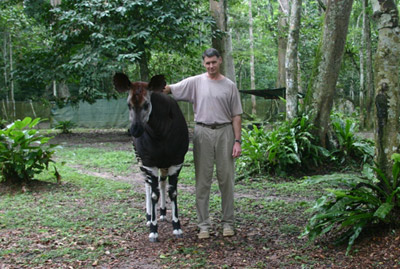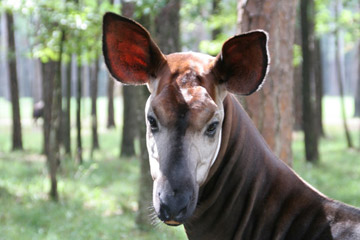
Okapi
Two wildlife rangers were among the six people killed during brazen attack on a wildlife facility by a militia in the Democratic Republic of Congo last Sunday. 13 endangered okapi were slaughtered during the early morning raid, which was reportedly a response to a crackdown on illegal elephant poaching and gold mining inside the Okapi Wildlife Reserve.
The attack was led by Mai Mai Simba rebels, according to the Okapi Conservation Project, which runs Okapi Wildlife Reserve. The militia destroyed buildings and equipment at the facility, which is shared by the Institute in the Congo for Conservation of Nature (ICCN) and the Okapi Conservation Project. Computers, phones, medical supplies, food, and other gear were stolen.
The dead include two ICCN rangers, the wife of one of the rangers, an immigration worker, and 2 residents of Epulu, the town where the attack took place.
 John Lukas with an okapi at the OCP’s research and breeding station in Epulu DRC. |
“There are no words to describe the loss of the okapi at the station, some of which have been in residence for over 23 years and all made it through seven years of civil war unscathed,” wrote John Lukas, head of the Okapi Wildlife Reserve, in a field update posted on the Wildlife Conservation Network’s web site. “They were ambassadors for all wildlife in the forest and had been helping educate visitors to the Station of the marvels of the diversity of life in the rainforest for over 25 years.”
The rebels killed 13 “ambassador” okapi, which were used by the group to raise local awareness about the species and their forest home. One okapi was injured.
Lukas said the attack was retaliation for recent efforts to stop elephant poaching and mining in the reserve.

|
“It must be made clear that the Mai Mai Simba rebels are not fighting for a political cause. This group is made up of elephant poachers and illegal miners,” he wrote. “The attack on the Epulu Station was in retaliation for recent engagements by ICCN rangers that disrupted poaching and mining activities in the Southern part of the Reserve. The rebels want to be free to reopen the mines and poach wildlife without interference.”
Lukas said the attack was not entirely unexpected.
“Since March of this year ICCN and its partners in Epulu have been requesting assistance as it was clear there was intent of a retaliatory action from these rebels. The lack of response to these pleas has now resulted in a terrible loss of life.”
The Okapi Conservation Project has launched an emergency appeal to raise funds to rebuild the facilities and resume anti-poaching patrols.
“All of our thoughts are with the people of Epulu and the families that lost loved ones. We thank our friends for their concern during this tragic time and know that with your support the Okapi Conservation Project and ICCN will again be working together to safeguard the forest home of the okapi.”
Related articles
Saving Africa’s ‘unicorn’, the okapi
(9/2/2012) The giraffe is one of Africa’s most recognizable animals, but its shy and elusive forest cousin, the okapi, was so little known that until just over a century ago the western world believed it was a mythical beast, an African unicorn. Today, a shroud of mystery still envelops the okapi, an animal that looks like a cross between a zebra, a donkey, and a giraffe. But what is known is cause for concern. Its habitat, long protected by its remoteness, was the site of horrific civil strife, with disease, famine, and conflict claiming untold numbers of Congolese over the past decade. Now, as a semblance of peace has settled over Democratic Republic of Congo (DRC), the okapi’s prospects have further dimmed, for its home is increasingly seen as a rich source of timber, minerals, and meat to help the war-torn country rebuild.







